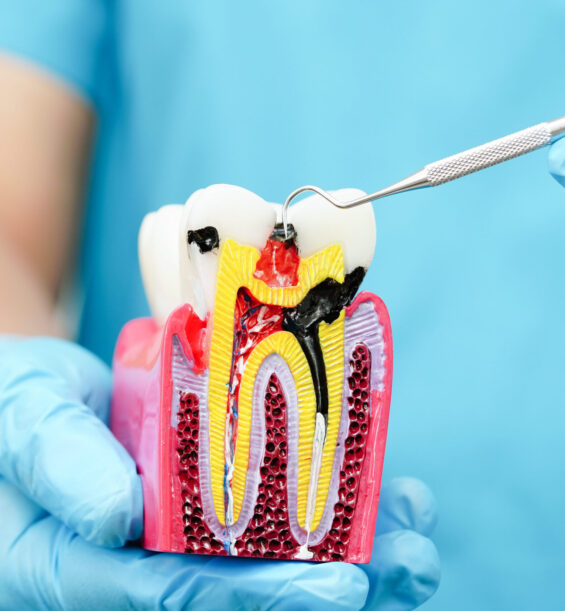When Do You Need a Root Canal Treatment? Signs and Symptoms
If you've ever had a toothache that just won't quit, you've probably heard the term "root canal" floating around. And let’s be real - those two words can make anyone feel a little uneasy. In fact, a Root canal treatment isn’t as scary as people make it out to be. In reality, it’s one of the best ways to save a tooth and ease any pain you might be feeling.
Knowing when it could be required is crucial. You can save yourself a lot of pain by recognizing the signs and symptoms of root canals that suggest you might need treatment. So, let’s dive into what Root canal treatment is all about and when it’s actually needed.
What is a Root Canal Treatment?
It's important to get a clear picture of what a root canal treatment really is before we jump into the symptoms. A lot of people mistakenly believe that a root canal means pulling out a tooth. But actually, it's all about saving your tooth when it's facing some serious issues.
Every tooth has a soft tissue known as a pulp. This pulp contains nerves, blood vessels, and connective tissue that help the tooth grow. If the pulp gets infected or irritated, it can lead to severe pain and other problems. In a Root canal treatment, the damaged or dead pulp is taken out, the inside of the tooth is cleaned to avoid infection, and then it's filled with a special material to protect it.
Once the procedure is done, the tooth can still function normally for years to come. It's essentially your tooth's final hope of surviving. Now that you are aware of the basics, let's discuss when you might require one.
1. Persistent Tooth Pain
Tooth pain can come from a bunch of different issues, but if it sticks around or keeps coming back, you should definitely pay attention. If you're feeling pain that lasts for days or even weeks, it might be a sign of a problem with the tooth pulp. This pain can range from really intense to a dull throb, and sometimes it can radiate to your jaw, face, or ears, making it tricky to pinpoint which tooth is causing the trouble. If over-the-counter pain relievers aren't working, it might be time to book an appointment with your dentist. Chronic pain like this often means you could need a root canal treatment.
2. Sensitivity to Hot and Cold
Have you ever grabbed a scoop of ice cream or sipped on some hot coffee and felt a jolt of tooth pain? That’s tooth sensitivity, and it can be a red flag. It might happen for various reasons, like gum recession or worn enamel. If that sensitivity sticks around long after you’ve had something hot or cold, it could mean your tooth's nerve is in trouble or even infected. This might suggest that the pulp is irritated, and you could be looking at a root canal.
3. Swollen or Tender Gum
Swollen gums often point to gum disease, but they can also signal a bigger problem with the tooth. This swelling might come from an infection in the tooth's pulp. You might notice tenderness, puffiness, or even a small bump on your gums, which is called a dental abscess. This abscess is a pus-filled pocket caused by the infection and is a warning that something is seriously off. Ignoring it could cause the infection to spread and result in swelling in your jaw or face. If you notice this, you may need to have a root canal treatment to remove the infection and save your tooth.
4. Darkening of the Tooth
Graying or darkening teeth may be more than just a cosmetic concern. A tooth that’s changing color might be doing so due to an infection or injury that’s causing the inner pulp to decay. This change in color often means that the nerve inside the tooth is either dead or on its way out. If it doesn’t get treated, the tooth could end up not working at all. In these situations, a root canal can get rid of the dead tissue, stop additional harm, and keep your tooth in its natural position.
5. Discomfort When Biting or Touching the Tooth
If you're feeling intense pain when you bite into food or even just touch your tooth, it could mean there's some internal damage. When the pulp inside your teeth gets inflamed or infected, it can make your teeth super sensitive to pressure. Chewing or applying pressure to a single spot may make this pain worse. People frequently attempt to completely avoid using that side of their mouth. If you're dodging certain foods or having a tough time chewing, it’s a good idea to visit a dentist. A root canal treatment can ease the pain by tackling the root cause of infection or inflammation.
6. A Cracked or Chipped Tooth
Accidents happen, and a cracked or chipped tooth might seem like no big deal at first. However, infection can happen from even minor injuries that let bacteria get to the inner pulp. If pulp inflammation isn't treated, it can lead to pain and might mean you need a root canal. So, to steer clear of that root canal down the line, it's smart to have a dentist check out any damage and see if you need any treatment.
7. Persisting Discomfort After a Filling
Sometimes, after a cavity is filled, a tooth may still feel sensitive for a short period. But if the pain persists or gets worse, it can mean that the decay was more extensive than first believed and reached the pulp. In situations where a filling is insufficient, a root canal treatment may be necessary to eliminate the infected tissue and restore the health of the tooth.
The Root Canal Procedure: What to Expect
If your dentist tells you that you need a root canal, don’t panic. The procedure itself is typically no more painful than getting a cavity filled. It’s done under local anesthesia, so you won’t feel any pain during the treatment. The process usually takes one or two visits, depending on the condition of the tooth. During the procedure, your dentist or endodontist (a root canal specialist) will remove the infected pulp, clean and disinfect the inside of the tooth, and then fill it with a special material. After the procedure, the tooth is usually covered with a dental crown to protect it.
While the thought of a root canal treatment might be daunting, it’s often the best option for saving your tooth and preventing further complications. Left untreated, the infection in your tooth can spread to other areas, leading to more pain and even tooth loss.
Achieve Optimal Oral Health with Elite Smile Family Dentistry
At Elite Smile Family Dentistry, we believe that everyone deserves a healthy, beautiful smile. Whether you're coming in for a routine checkup or a more advanced procedure like a root canal treatment, our team is dedicated to providing you with the highest level of care in a comfortable, friendly environment. We use the latest technology and techniques to ensure every treatment is as pain-free and efficient as possible, prioritizing your comfort and dental health.
Our dentists and staff take the time to understand your unique needs and work with you to develop a personalized treatment plan that fits both your schedule and budget. From routine teeth cleanings and cosmetic dentistry to complex restorative dentistry work, we aim to make your visit as stress-free as possible.
When you choose Elite Smile Family Dentistry, you’re not just another patient - you’re part of our family. Let us help you in preserving a lifetime of radiant, healthy smiles. Schedule your appointment and experience the difference that compassionate, expert care can make.


